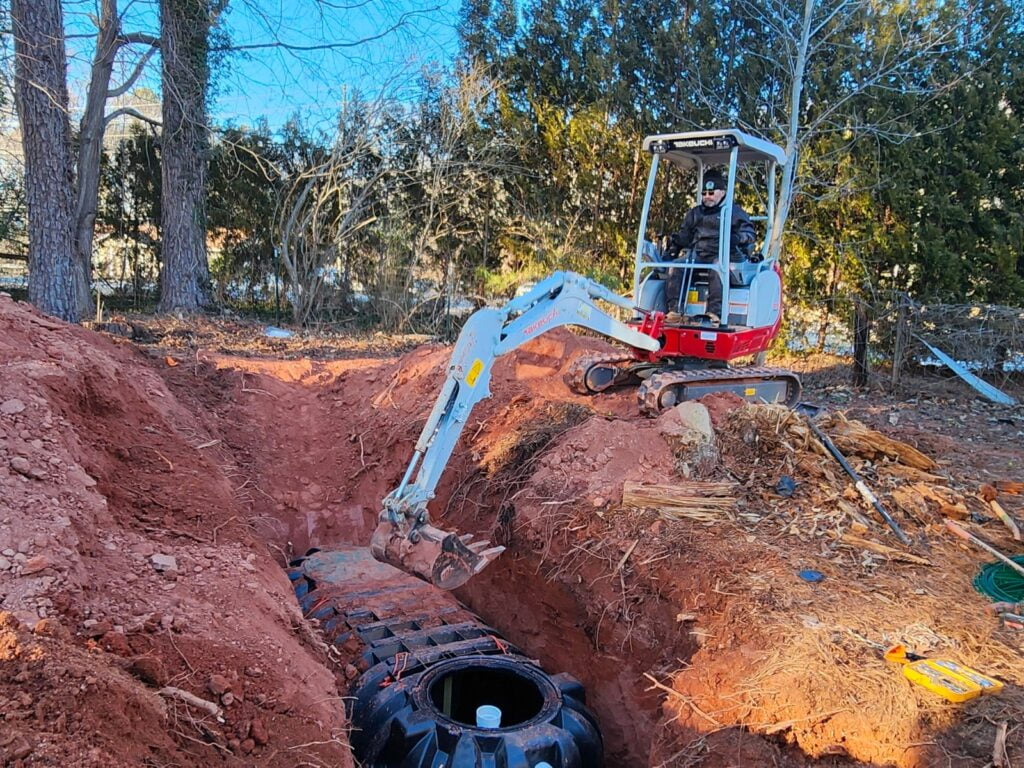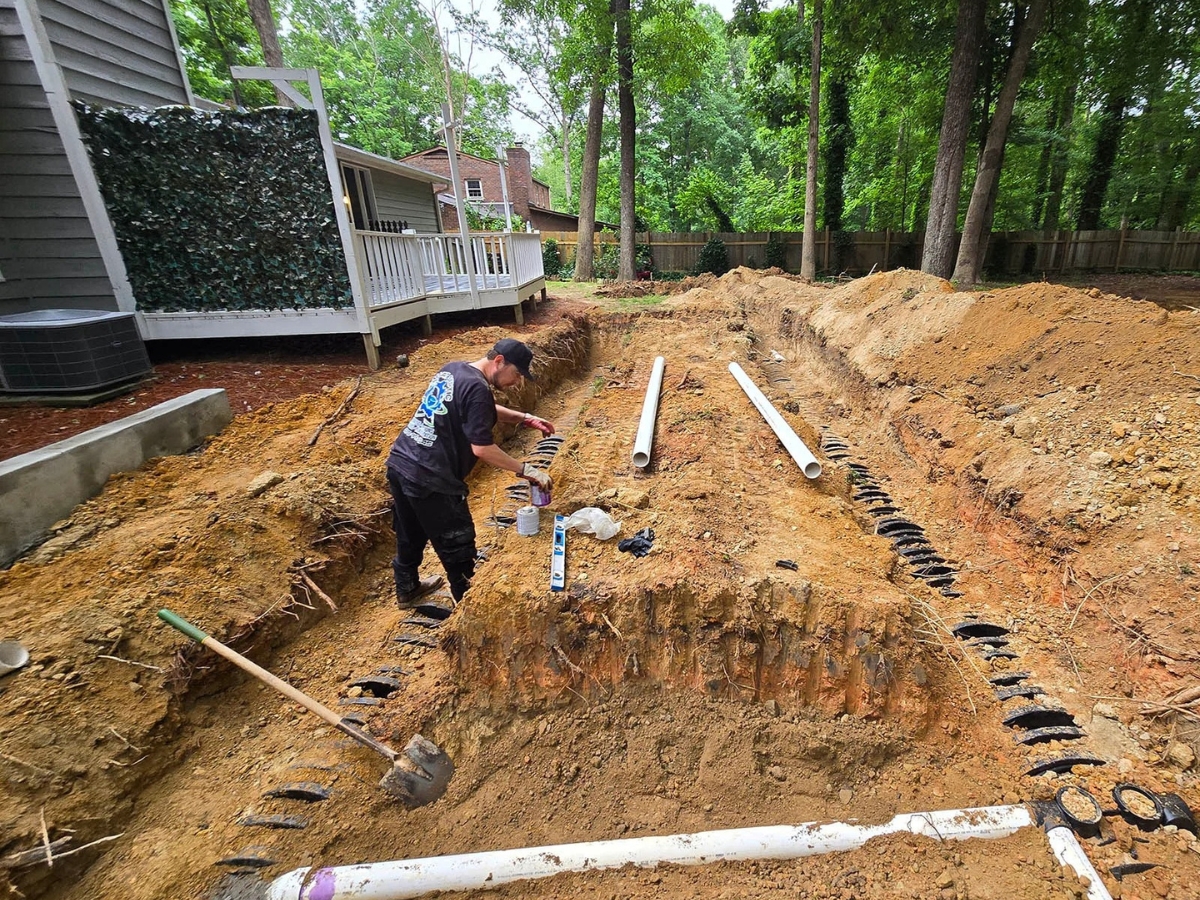Introducing Smart Septic Pros, your trusted partner in enhancing environmental health through effective septic tank solutions. With expertise in septic tank installation, pumping, and maintenance, they ensure that septic drain fields work efficiently, contributing to sustainable wastewater management.
Understanding the importance of proper septic systems is crucial for both residences and businesses. Keep reading to discover the benefits, innovative designs, and future directions in septic systemsustainability that can make a real difference for your property and the environment.
Essential Insights and Key Highlights
Understanding Septic Tanks in Sustainable Wastewater Management

Septic tanks play a crucial role in sustainable wastewater management by effectively handling sewage while promoting environmental health. Understanding how these septic tank installation systems operate is fundamental to appreciating their contribution to reducing pollution. By breaking down sewage and managing sewage sludge safely, septic systems prevent harmful contaminants from entering local waterways, thus addressing issues like smog and toxic run-off.
Their design incorporates septic drain fields, key components that not only facilitate waste treatment but also support long-term sustainability, aligning with local laws and bolstering economic development. This comprehensive approach ensures that communities can effectively manage wastewater while protecting their natural surroundings. For septic tank pumping services, please contact Smart Septic Pros.
How Septic Systems Work to Manage Wastewater
Septic systems manage wastewater through a series of processes that transform harmful substances into less harmful forms. As waste enters the septic tank installation, solids settle at the bottom, while oils and grease rise to the top, creating layers that allow for liquideffluent to flow out into septic drain fields.
This method not only reduces the water footprint of households but also supports techniques like rainwater harvesting, helping communities utilize their resources without causing injury to the ecosystem. For septic tank pumping, contact Smart Septic Pros.
The Role of Septic Tanks in Reducing Water Pollution
Aerobic Septic Systems play a pivotal role in reducing water pollution, especially in the face of climate change and its increasing effects on natural water sources. By effectively managing nitrogen levels in wastewater, they help minimize harmful runoff that can lead to issues like algae blooms in lakes and rivers.
Protecting local waterways is not only essential for environmental health but also supports economic growth, ensuring communities thrive amidst changing conditions. For septic tank installation, septic tank pumping, or septic drain fields, contact Smart Septic Pros.
Key Components of a Septic System for Sustainability
The key components of a septic system greatly contribute to sustainability by promoting resource recovery and minimizing environmental risks. By effectively treating waste with septic tank installation, these systems help reduce the emission of harmful gases like carbon dioxide, which plays a significant role in the greenhouse effect. Incorporating advanced technologies, some septic systems can even integrate incineration methods septic drain fields to further minimize waste, ensuring a more eco-friendly approach to wastewater management.
Septic tanks play a pivotal role in keeping our environment healthy and thriving. Let’s explore the remarkable ways they contribute to sustainable practices and protect our natural ecosystems!
The Environmental Benefits of Using Septic Tanks

Septic tanks offer various environmental benefits, contributing significantly to sustainable water treatment practices. By utilizing natural filtration systems, they reduce the need for harmful chemicals, which can impact overall sanitation and public health. This lessens the burden on municipal sewage systems, allowing them to operate more efficiently while minimizing potential conflicts of interest related to infrastructure development.
Moreover, when managed properly, septic systems can promote groundwater recharge, ensuring that fresh water is available for various needs. This approach not only protects local water supplies but also helps alleviate health concerns, such as asthma, linked to poor air and water quality. With these advantages, septic tanks stand out as a viable solution in maintaining environmental integrity.
Natural Filtration and Reduced Chemical Use
Septic tanks employ natural filtration processes that mimic the cleansing action of a pond, allowing sunlight and oxygen to play vital roles in breaking down waste. This organic approach reduces the need for harsh chemicals, which can be harmful to the surrounding ecosystem and hinder environmental protection efforts.
By promoting this sustainable method, communities can minimize reliance on coal-generated power sources often associated with chemical treatments, fostering a healthier environment for everyone.
Decreasing the Burden on Municipal Sewage Systems
Septic tanks play an important role by lessening the burden on municipal sewage systems. With more households relying on these systems for sustainable management, there’s less demand on central treatment facilities. This means municipalities can focus on other vital processes such as desalination and ensuring a clean supply of drinking water for their communities.
By utilizing septic tanks, communities help create a healthier habitat. This shift also allows for the potential integration of automation in wastewater management, making systems more efficient. When septic systems are properly maintained, they can significantly reduce the pressure on municipal infrastructures.
- Septic systems provide a sustainable solution for wastewater treatment.
- They reduce the load on municipal facilities.
- Communities benefit from improved water quality for drinking and habitat health.
- Automation can enhance the efficiency of wastewater management.
Promoting Groundwater Recharge Through Proper Septic Management

Proper management of septic systems plays a vital role in promoting groundwater recharge, which is essential for maintaining healthy water supplies. By facilitating the natural decomposition processes that occur within these systems, they support the growth of beneficial organisms that help filter waste. This approach not only reduces greenhouse gas emissions but also supports communities, helping them combat poverty by ensuring access to clean and safe water resources.
As the demand for eco-friendly solutions rises, innovative septic system designs are stepping up to meet these challenges. Discover how these modern advancements contribute to a more sustainable future for our environment.
Innovative Septic System Designs for Better Sustainability
Innovative septic system designs are reshaping how communities manage wastewater sustainably. With advancements in septic tank technologies, systems are becoming more efficient and effective at reducing contamination. The focus on eco-friendly materials for septic tankconstruction helps address concerns around petroleum-based products, making systems more environmentally conscious.
Moreover, integrating septic systems into green infrastructure not only promotes better governance of local water resources but also safeguards public health by preventing cholera and other waterborne diseases. This strategic approach enhances community resilience while ensuring vital ecosystems remain healthy and flourishing.
Advancements in Septic Tank Technologies
Recent advancements in septic tank technologies highlight innovative approaches that enhance their efficiency and sustainability. New designs incorporate biofilters and membranes that improve wastewater treatment, making the systems more effective in preventing contaminants from reaching groundwater. A literature review on these technologies indicates that integrating advanced materials, like crystal-enhanced properties, can help further reduce environmental impacts, especially in areas like Basel where water quality is crucial.
The developments also extend to the integration of septic systems with smart monitoring systems, providing real-time data on their performance. This shift promotes proactive maintenance and mitigates potential health risks associated with improper waste management. Smart systems not only support sustainable practices but also align with property development standards, particularly in regions focused on responsible mining operations.
These exciting innovations emphasize the importance of sustainable solutions in wastewater management:
- Efficiency improves with new biofilters and membranes.
- Real-time monitoring ensures proactive maintenance.
- Technologies align with property and environmental standards.
- Focus on sustainability is critical in wastewater management.
Eco-Friendly Materials for Septic TankConstruction

Using eco-friendly materials for septic tankconstruction contributes significantly to enhancing the overall quality of life within communities. These sustainable materials help mitigate methane emissions, ensuring a healthier environment while protecting vital fresh water resources.
By aligning construction practices with thoughtful policy and eco-conscious choices, communities can better safeguard surface water from potential contamination, promoting a sustainable approach to wastewater management.
Integrating Septic Systems With Green Infrastructure
Integrating septic systems with green infrastructure has become a promising strategy for enhancing community health while managing wastewater sustainably. This integration involves careful analysis of local water resources and helps address issues like overdraft, ensuring that fresh water is safeguarded against contamination from harmful pathogens that can cause diseases such as dysentery.
Moreover, blending these systems with natural landscapes can improve air quality, potentially reducing allergy triggers and promoting better overall productivity for residents and local ecosystems.
Exciting new designs promise a sustainable future for septic systems, but the journey doesn’t stop there. Understanding the challenges these systems face, including septic drain field requirements, is crucial for effective management and long-lasting success.
Challenges and Solutions in Septic Tank Management

Septic tank management faces its own set of challenges that consumers and professionals alike must navigate to ensure sustainable wastewater practices. Common issues, such as system clogging and improper waste disposal, require attention and proactive solutions. Implementing best practices for maintenance can significantly enhance a septic system‘s efficiency, contributing to better water purification results.
Regulatory frameworks, including guidelines established by organizations like the American Society of Civil Engineers, play a crucial role in promoting sustainability and addressing problems that can arise. Cities like Mexico City serve as case studies for the importance of these regulations in maintaining a healthy balance between urban development and environmental health. Understanding these aspects equips consumers with the knowledge to manage their septic systems effectively, benefiting both their households and the surrounding community.
Addressing Common Problems With Septic Systems
Septic systems can face several issues that impact their performance, such as the buildup of heavy metals in the waste they process. Proper drainage is vital to prevent these metals from accumulating and causing problems in the system’s cells. Upgrading to advanced materials like polymer membranes can enhance the efficiency of the septic process, using methods involving hydrogen to break down waste and reduce harmful substances.
- Heavy metals can accumulate in septic systems.
- Maintaining proper drainage is essential for performance.
- Polymer membranes can enhance systemefficiency.
- Hydrogen plays a role in breaking down waste.
Best Practices for Maintenance to Ensure Efficiency
To maintain the efficiency of septic tanks, regular inspections and pumping are crucial. By ensuring that the septic system meets the growing demand for proper sewerage management, homeowners contribute to a healthier waterwayecosystem. This proactive approach aligns with the principles of a circular economy, where resources are reused and waste is minimized, supporting environmental sustainability.
Regulatory Frameworks Supporting Septic TankSustainability
Regulatory frameworks play a vital role in supporting sustainability within septic tank management. These regulations guide construction practices to minimize landfillwaste and encourage the use of innovative environmental technology. By addressing issues such as erosion and promoting effective waste management strategies, these frameworks help protect communities and their natural resources.
Effective septic tank management often leads to remarkable transformations. Let’s explore some real-life examples where challenges turned into successful outcomes.
Case Studies: Successful Septic Management Projects
Efforts to enhance environmental health through septic tank solutions have gained momentum across various settings. Rural areas are embracing sustainable septic practices tailored to their unique needs, easing stress on local waterways and supporting groundwater quality. Meanwhile, urban innovations are showcasing small-scale septic systems that prove effective in densely populated environments, ensuring that even in cities, waste management aligns with sustainable development goals.
Globally, several inspiring examples illustrate how septic tanks not only improve sanitation but also contribute to flocculation processes that naturally filter contaminants, paving the way for cleaner and healthier ecosystems. Together, these case studies reflect the positive impacts of effective septic management on communities worldwide.
Rural Areas Implementing Sustainable Septic Solutions

Rural areas are increasingly adopting sustainable septic solutions to bolster their hygiene standards while ensuring effective wastewater management. The integration of beneficial bacteria in septic systems helps break down waste efficiently, promoting groundwater recharge which is vital for maintaining fresh water supplies. Recent literature highlights that many rural communities are not only improving their sanitation but also enhancing practices in the food industry by utilizing recycled water responsibly.
This shift toward sustainable practices in rural areas reflects a broader commitment to environmental health. Communities benefit from:
- Effective bacteria use in septic systems.
- Improved hygiene and sanitation.
- Positive impacts on groundwater recharge.
- Reinforced practices in the food industry.
Urban Innovations: Small-Scale Septic System Successes
Urban areas are increasingly turning to small-scale septic systems that provide effective solutions for wastewater management while preserving environmental integrity. These innovative systems not only reduce sedimentpollution but also recycle nutrients, leading to the production of renewable natural gas which can be harnessed for energy.
By ensuring that waste is treated safely and efficiently, cities lay the groundwork for healthier ecosystems, benefiting not just the current population but also securing a cleaner world for future generations.
Global Examples of Septic Tanks Enhancing Environmental Health
Across the globe, septic tanks are proving to be an effective method for enhancing environmental health through improved wastewater treatment practices. In several countries, statistics show that these systems significantly contribute to the digestion of organic matter while promoting healthy soil and biodiversity. Successful projects highlight how well-managed septic systems not only reduce pollution but also support the ecosystem, allowing plants and wildlife to thrive in cleaner environments.
The journey through successful septic management has showcased innovative solutions that set the stage for what’s next. As the industry evolves, fresh approaches to sustainability are emerging, leading the way for a greener future.
Future Directions in Septic SystemSustainability

As communities continue to seek solutions to modern environmental challenges, several research trends and emerging septic technologies are shaping the future of sustainable wastewater management. Innovations focus on reducing ammonia levels and mitigating plastic pollution, ensuring that septic systems evolve to meet the needs of both urban and rural areas. Developing countries present a significant opportunity for these systems, where simple yet effective designs can provide proper sanitation and help combat waterborne diseases.
Policy initiatives and educational efforts are crucial to encourage widespread adoption of these technologies, guiding communities to navigate this changing tide towards a cleaner future. Together, these dimensions promise to enhance environmental health while addressing pressing matters that impact water quality and ecosystem resilience.
Research Trends and Emerging Septic Technologies
Research in Oregon focuses on integrating greywater systems into septic designs, promoting sustainable energy use while enhancing the natural water cycle. These innovative approaches ensure that wastewater can be reused effectively, reducing pollutants and supporting overall environmental health.
The concept of informed consent becomes crucial as communities adopt these technologies, ensuring everyone understands the benefits and responsibilities associated with sustainable wastewater management.
The Potential for Septic Systems in Developing Countries
Septic systems in developing countries hold significant potential for enhancing environmental health by promoting energy recovery and effective waste management. These systems can efficiently convert organic waste into useful fertilizer, while also addressing the challenges posed by climate change. As these regions gain attention for innovative solutions, integrating smart technologies like sensors can improve system monitoring and maintenance, ensuring sustainability and efficiency.
- Septic systems can convert waste into fertilizer, contributing to soil health.
- Energy recovery from waste helps reduce reliance on traditional energy sources.
- Smart sensors monitor system performance for better maintenance.
- Addressing climate challenges is crucial for sustainable development.
Policy and Education Efforts for Widespread Adoption
Effective policy and education efforts are essential for the widespread adoption of environmentally friendly septic systems. By raising awareness about sustainable practices, communities can see how these systems positively impact the atmosphere and contribute to a healthier landscape.
Additionally, integrating education into agricultural programs can help farmers understand the benefits of proper waste management, leading to improved consumption of resources while maintaining ecological balance.
Conclusion
Septic tanks play a vital role in enhancing environmental health by effectively managing wastewater and preventing pollution. They support groundwater recharge and reduce the burden on municipal sewage systems, promoting cleaner water sources for communities. Innovative designs and eco-friendly materials further improve the sustainability of these systems.
By implementing proper maintenance practices, communities can ensure efficient wastewater management while safeguarding their natural resources. Contact Smart Septic Pros



